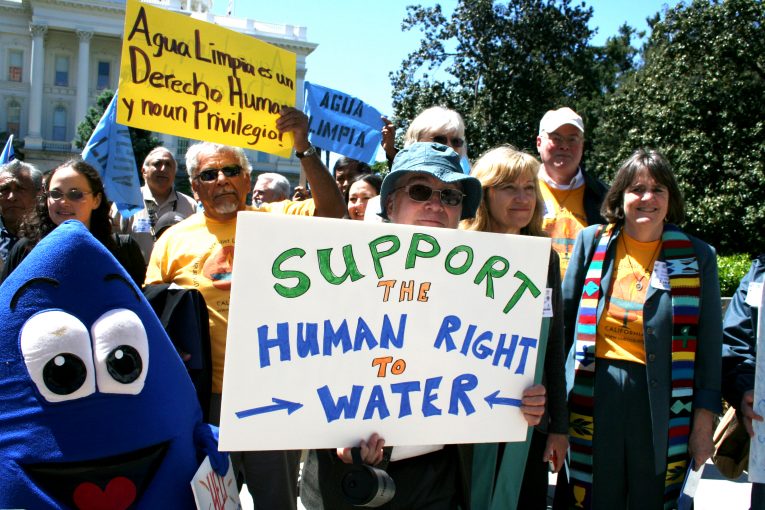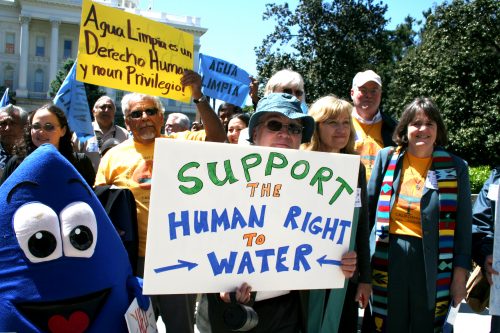

By Miri Valenzuela
The lack of access to clean water is responsible for millions of deaths each year. Unfortunately, as the climate crisis exacerbates the scarcity of this valuable resource, we must come to terms with a reality that calls for a discussion about water, policy, and health outcomes.
This topic requires a criticism of the systems that have placed water at the center of political, environmental, and health discourse. Globally, water utilities tend to fall into two categories, the private and/or the publicly owned. In the U.S., the 1990’s was the period when privatization expanded to tackle inequalities and political affiliation. But based on the histories that link water politics to ecosystem deterioration and discriminatory practices, it is obvious that this issue continues, unresolved.
In California, communities in the San Joaquin Valley illustrate how policies around water have not solved inequities or groundwater degradation. According to the State Water Resources Control Board, the 13 counties that make up this region have over 175 failing water systems in need of repair. On top of that, with long drought periods, groundwater pumping has led to water pollution impacting mostly low-income residents and people of color who work in the agriculture industry. Since 2017, California has been providing funding to fix all at-risk water systems, but even with additional state emergency grants, it has fallen short. In a similar manner, drought water legislation like the Emergency Regulation to Prohibit Wasteful Water Uses has not deterred private landowners from overwatering and overusing groundwater, exposing people to unsafe water sources.
Clearly, the politics surrounding water have not improved and continue to affect our ways of living, impacting the most vulnerable. By ignoring how policy has shaped society, we are becoming a byproduct of an oppressive cycle. We can see how damaging the fight for this resource is by looking at the colonization of the US. As indigenous groups were being displaced and killed by our government to take over the land and its resources, our ecosystems were heavily impacted by infrastructure expansions. Today, we are expected to take responsibility for cleaning up the mess left by those before us.
In other words, when water entered the market as a commodity, the U.S. economic model made sure consumers paid a price for it. Think of this as either a monetary price or a health price. The need to mass produce goods and services introduced new technologies that quickly impacted health outcomes of workers and the overall population. With land expansion, we saw a rise in agricultural practices, fossil fuel dependency, and often dismissed our need for water. By agreeing to pay a price for water, our health and us have become a byproduct of its exploitation.
In fact, many social scientists argue that putting a price tag on water demonstrates how common it has become for our institutions to divide and harm us. Drawing examples from the Covid-19 pandemic, we saw government officials traveling or hosting parties while our most underserved communities suffered from lack of access to basic services. As stay at home orders were being issued, many could not afford losing their pay, adding emotional and financial stressors. We were told that washing our hands with soap and water for 15 seconds was as important as wearing an N-95 mask to prevent spreading the virus. But these prevention recommendations came too late for those already ill or those unable to pay for bottled water or district water services. During this time, the term “essential worker” was used by many politicians to describe those who were critical to the functioning of society. To distract the population from the horrors caused by our institutions, news channels praised health care workers, drivers, educators, and many others who risked their lives to keep us alive and to keep corporations making money. But these heroes also got sick, showing us how expendable the labor force is to our government when needing to keep the economy afloat. Undoubtedly, water was at the center of political and health policy concerns.
Humans and natural resources will always be closely tied to the institutions they interact with. What the pandemic was able to do for us is expose our government’s incapacity to implement policies and carry them out. From the top down, we saw how slow some U.S. states were to adopt drastic measures even after seeing an increase in the number of fatalities. But those who did act quick had to face the backlash of businesses who saw a decrease in customer spending. This lack of collaboration to implement a plan led to chaos at the federal, state, and local levels. Everything was rushed, from tracking the virus spread, to allocating handwashing stations, to the distribution of vaccines. This issue in its entirety should be at the forefront of our water policy discussions since it highlights how having power over water can cost us the lives of people we love.
With similar health and environmental disasters ahead due to anthropogenic climate change, our main concern should revolve around issues of water policy. Water is political, it is health, and it is becoming less accessible to us. In a 2021 report, the Public Policy Institute of California not only noted water prices increasing in the state, but also blamed Proposition 218 for restricting public water agencies in assisting low income customers with water bills. Proposition 218 made it more difficult for local governments to increase taxes, decreasing revenue that could potentially fund assistance programs for low income communities. If we think of places like San Francisco, or Los Angeles, we should expect to see even higher rates due to population size. Added to the stress of inflation and job loss, water infrastructure hikes are not a benefit but an added burden. In other words, while storms might seem to be filling up our reservoirs, price hikes are burning holes in our pockets. We should be aware that the lack of access to water and water sanctions will only aggravate inequalities, impacting the same communities that have historically been hit the hardest.
It is understandable that a lot of what has been mentioned might seem like déjà vu, but it is time we wake up to this new reality. As common as wildfires and droughts are becoming in California, sea level rise will not only increase the severity of tropical storms, but also the degradation of our ecosystems and health outcomes. While we tend to ignore our relationship with the environment, we must begin to think about the long-term impacts on our health when these climatic events occur. Water, as much as we have taken it for granted, is key to our future survival. Allowing our governments to control us by adjusting water prices without creating sustainable plans to mitigate water pollution and contamination is a disregard to all human life.
Now, it would be unreasonable to expect to change the course of the climate and health crisis, but as a starting point, we can work on holding people accountable when it comes to our rights. Talking to a local representative about conservation practices or supporting your local agencies by educating people about water usage can go a long way. Something as easy as downloading water-saving applications like H2O Tracker, or a water-consumption-based application like E-Water Footprint can provide perspective and help us find new ways to approach water issues. Confronting this reality might seem like a hard task now, but it should not deter us from putting a limit to the abuse. Our goal should be straightforward: achieve water justice.
Miri Valenzuela is a writer for the Vanguard at Berkeley’s Social Justice Desk.




